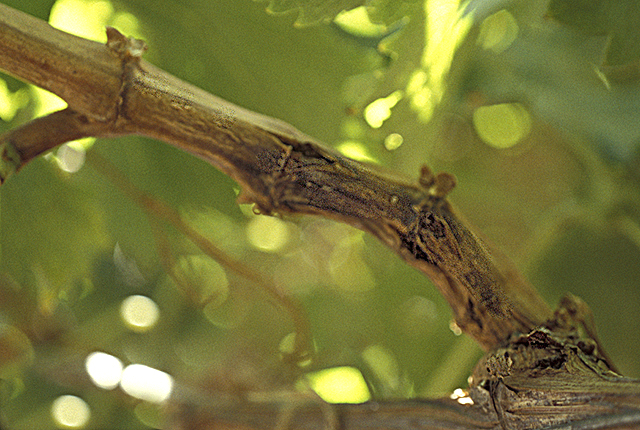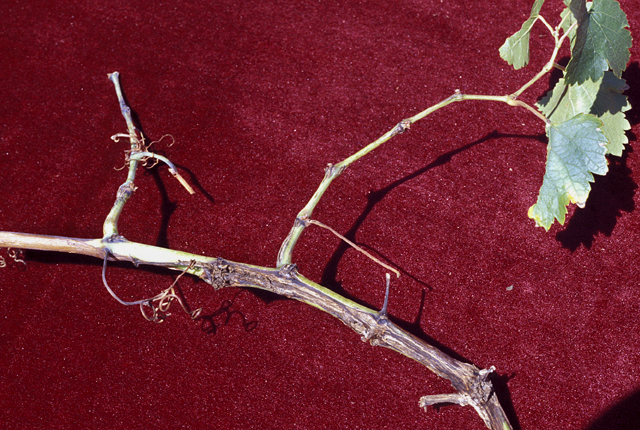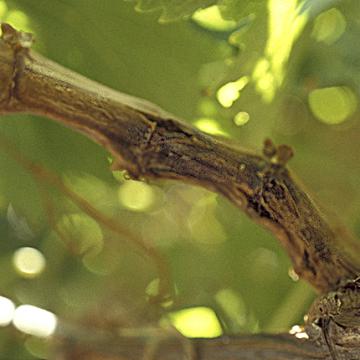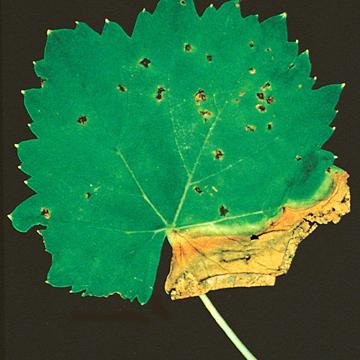DISEASE: Bacterial blight (Bacterial necrosis)
HOST: Grape
Stem necrosis of grape.

Bacterial blight (Bacterial necrosis) | Grape
DISEASE: Bacterial blight (Bacterial necrosis)
HOST: Grape (Vitis vinifera)
PATHOGEN: Xylophilus ampelinus
PATHOGEN SYNONYM: Xanthomonas ampelina
SOURCE: N. Schaad
DISEASE: Bacterial blight (Bacterial necrosis)
HOST: Grape
Stem with cankers and discolored external tissues.

Bacterial blight (Bacterial necrosis) | Grape
DISEASE: Bacterial blight (Bacterial necrosis)
HOST: Grape (Vitis vinifera)
PATHOGEN: Xylophilus ampelinus
PATHOGEN SYNONYM: Xanthomonas ampelina
SOURCE: N. Schaad
DISEASE: Bacterial blight (Bacterial necrosis)
HOST: Grape
Severe infection in vineyard is noted by dead canes. Symptoms are most severe in spring; shoot blight, occasional spots on leaves, and cankers are common.

Bacterial blight (Bacterial necrosis) | Grape
DISEASE: Bacterial blight (Bacterial necrosis)
HOST: Grape (Vitis vinifera)
PATHOGEN: Xylophilus ampelinus
PATHOGEN SYNONYM: Xanthomonas ampelina
SOURCE: C. Manceau, N. Schaad
DISEASE: Bacterial blight (Bacterial necrosis)
HOST: Grape
Leaf with necrotic spots and marginal necrosis. One-sided cracking of petiole tissue is common (not shown here).

Bacterial blight (Bacterial necrosis) | Grape
DISEASE: Bacterial blight (Bacterial necrosis)
HOST: Grape (Vitis vinifera)
PATHOGEN: Xylophilus ampelinus
PATHOGEN SYNONYM: Xanthomonas ampelina
SOURCE: C. Panagopoulos
DISEASE: Olive knot
HOST: Olive
Multiple infections of young stems. The bacterium invades vascular tissues during certain times of the year and may be isolated from branches that appear healthy.

Olive knot | Olive
DISEASE: Olive knot
HOST: Olive (Olea europaea)
PATHOGEN: Pseudomonas savastanoi pv. savastanoi
SOURCE: M. Schroth
DISEASE: Olive knot
HOST: Olive
Tree with knots/galls on branches along with twig dieback, which is associated with knots. Fusarium and Diplodia spp. infect through knots and are thought to be main reason for dieback.

Olive knot | Olive
DISEASE: Olive knot
HOST: Olive (Olea europaea)
PATHOGEN: Pseudomonas savastanoi pv. savastanoi
SOURCE: M. Schroth









